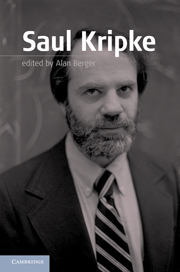Book contents
- Frontmatter
- Contents
- List of Contributors
- Introduction to Kripke
- Part I Naming, Necessity, and Apriority
- Part II Formal Semantics, Truth, Philosophy of Mathematics, and Philosophy of Logic
- 5 Kripke Models
- 6 Kripke on Truth
- 7 Kripke on Logicism, Wittgenstein, and De Re Beliefs about Numbers
- 8 Kripke on the Incoherency of Adopting a Logic
- Part III Language and Mind
- Part IV Philosophy of Mind and Philosophical Psychology
- Index
- References
8 - Kripke on the Incoherency of Adopting a Logic
Published online by Cambridge University Press: 05 June 2012
- Frontmatter
- Contents
- List of Contributors
- Introduction to Kripke
- Part I Naming, Necessity, and Apriority
- Part II Formal Semantics, Truth, Philosophy of Mathematics, and Philosophy of Logic
- 5 Kripke Models
- 6 Kripke on Truth
- 7 Kripke on Logicism, Wittgenstein, and De Re Beliefs about Numbers
- 8 Kripke on the Incoherency of Adopting a Logic
- Part III Language and Mind
- Part IV Philosophy of Mind and Philosophical Psychology
- Index
- References
Summary
In 1974, Saul Kripke gave a graduate seminar at Princeton purportedly on Wittgenstein’s Philosophical Investigations, with emphasis on the role of rules in Wittgenstein’s private language argument. Before beginning this topic, Kripke said that he would first make a “few remarks” on a topic related to the central point of Wittgenstein’s discussion of “rule-following,” namely, the topic of “adopting a logic.” Kripke chose to address some other related questions. They included his views on whether it is coherent to “have a logic” or for there to be an “alternative logic.” He also concentrated on the more restrictive thesis of whether there is a nontrivial, “non–garden variety” way in which one can “revise logic.” These “few remarks” took up the entire seminar, with many classes running more than one hour over the three hours allotted to each class.
In Section I, we discuss Kripke’s general objections to the notion of adopting a logic. In Section II, we consider a part of logic that may be immune to these objections. In particular, we consider whether it is coherent to adopt “quantum logic.” In Section III, we evaluate the claim of adopting intuitionist logic. Last, in Section IV, I suggest some morals to be learned.
- Type
- Chapter
- Information
- Saul Kripke , pp. 177 - 208Publisher: Cambridge University PressPrint publication year: 2011
References
- 3
- Cited by

